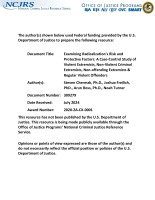Browse and search a list of publications and products both published by NIJ and resulting from NIJ funding. This list includes reports submitted by grantees, NIJ reports and other publications, NIJ Journal issues and articles, products published by grantees, and articles appearing in peer review and other publications.
Just Science Podcast: Just Managing Mass Fatality Incidents
Multidisciplinary Threat Assessment and Management Teams in Practice: Common Elements and Operations of Community Based MTAMTs
Choosing Where to Fight: Do Social Networks Distinguish American ISIS Foreign Fighters from ISIS-Inspired Terrorists?
Obstacles and facilitators to intimate bystanders reporting violent extremism or targeted violence
A two-step approach to detect and understand dismisinformation events occurring in social media: A case study with critical times
The Nature and Structure of MS-13 in Los Angeles County
Investigating Key Risk Factors Across Violent and Non-violent Extremists in the United States
The Role of Mass and Social Media in Radicalization to Extremism
Domestic Radicalization and Deradicalization: Insights from Family and Friends
Domestic Extremism: No One-Size-Fits-All Approach to Disengagement From Extremism Activity or Beliefs, Study Finds
Domestic Extremists and Social Media: Study Finds Similarities, Differences in Web Habits of Those Engaged in Hate Crimes Vs. Violent Extremism
Research in Brief: Community Policing Strategies to Prevent Violent Extremism
Bystander Reporting to Prevent Violent Extremism and Targeted Violence; Learning from Practitioners
Union Status, Union Dissolution, and Intimate Partner Violence: Investigating Johnson’s Typology Among Heterosexual Dating, Cohabiting, and Married Couples
Utilizing criminological theories to predict involvement in cyberviolence among the iGeneration
Enhancing Investigative Pattern Detection via Inexact Matching and Graph Databases
VideoTrain plus plus: GAN-based adaptive framework for synthetic video traffic generation
Adverse Childhood Experiences (ACE), Adolescent Misconduct, and Violent Extremism: A Comparison of Former Left-Wing and Right-Wing Extremists
Investigative and Prosecutorial Strategies for Mitigating Pathways to Radicalization: Creation of a Federal Terrorism Court Record Repository
Viewing Anti-Immigrant Hate Online: An Application of Routine Activity and Social Structure-Social Learning Theory
In North American Somali Communities, A Complex Mix of Factors Influence Gang Involvement, Violent Extremism
Research Forensic Library
We invite you to also search the Research Forensic Library, a curated collection of publicly-accessible material relating to every discipline of the forensic sciences.






